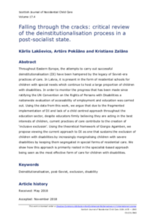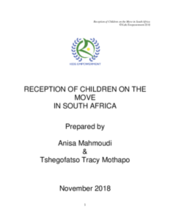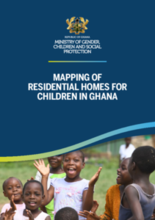Displaying 551 - 560 of 1460
Using the data from a a nationwide evaluation of accessibility of employment and education in Latvia, the authors of this paper argue that due to the fragmented implementation of deinstitutionalisation (DI) and lack of a child centred approach throughout the education sector, despite educators firmly believing they are acting in the best interests of children, current practices of care contribute to the creation of ‘inclusive exclusion’
This report from Kids Empowerment reviews the reception of children on the move in South Africa.
This geographical mapping and analysis of Residential Homes for Children (RHCs) in Ghana aimed to identify the “hot spots” - high concentration of RHCs and/or children in RHCs - and develop a comprehensive understanding of current trends, flows and drivers of children in RHCs in these “hot-spot” (priority) areas.
The aim of this study was to examine associations between mindfulness and psychological factors (i.e., depression, cognitive function, positive emotion, and negative emotion) among adolescent orphans in children's care homes in India.
Based on attachment theory, this study was conducted to analyze the contact between these children and their biological parents, and the factors affecting this contact.
This country care review includes the care-related Concluding Observations adopted by the Committee on the Rights of Persons with Disabilities.
Inquiries into historical institutional abuse have only recently come to be viewed through the lens of transitional justice. This article argues that their distinctive victim-focused approach disguises a reality that institutions in which violence was endemic blurred the line between victims and ‘perpetrators.’
According to some estimates, a third of the adult Moldovan population is working abroad, often ‘leaving behind’ children in the care of relatives, neighbours or in orphanages. This paper from the Journal of European Studies investigates how such high migration rates affect Moldovan family life and personal definitions of identity and success.
This country care review includes the care-related Concluding Observations adopted by the Committee on the Rights of the Child and the Committee on the Rights of Persons with Disabilities.
The US state of Washington’s foster care system has been sending many young people in need of residential care and treatment to the Clarinda Academy, an institution in Iowa. This is a report by Disability Rights Washington (DRW) to expose the conditions and treatment experienced by Washington foster youth at this institution.






